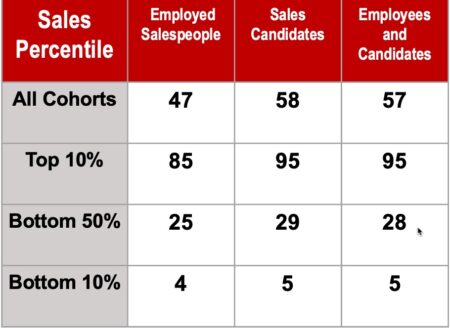- April 14, 2025
- Posted by: Dave Kurlan
- Category: Understanding the Sales Force

I was driving with the radio on when the Shania Twain song from the 90’s, Don’t Impress Me Much, began to play. I hadn’t heard that song in at least a decade and as I listened to the words, I was reminded that Shania is not impressed with:
- Rocket Scientists
- Brad Pitt
- Guys Who Kiss Their Expensive Shiny Cars
- Elvis
Most women would probably be impressed with that group of men but Shania is much more discerning. Shania sings that she wants a guy who will keep her warm in the middle of the night.
Most Sales Leaders must do a much better job attracting, vetting and hiring salespeople who will succeed and they could learn a lot from Shania Twain’s thinking.
Most Sales Leader seek out sales candidates with experience in their industry and a dressed-up resume to highlight that experience.
That Don’t Impress Me Much!
Industry experience, credentials, and degrees are mostly irrelevant in sales unless there are valid reasons, like, you sell:
- Nuclear materials and your salesperson must have a degree in nuclear physics
- You sell cyber-security systems to the federal government, including the military, and your salesperson must have a security clearance
Industry experience is also irrelevant when there is a guarantee that the new salesperson’s customers are moving with them to your company. If that’s the case, and it usually isn’t, it truly doesn’t matter if the salesperson is strong. Customers moving in a caravan to a new company happen so rarely, that even when promised, it’s not something you should factor in your sales hiring decisions.
What’s more important than industry experience? Sales excellence.
The average score from the 2.5 million salespeople who have been assessed across 21 Sales Core Competencies by Objective Management Group (OMG) is pathetic and the percentage of salespeople that are considered strong is below 10%!
It breaks down like this:
You don’t necessarily need to hire a salesperson or have salespeople working for you who are in the top 10%. Your needs are determined by 13 factors that determine the difficulty of the selling role (in no particular order):
- resistance
- price points
- average deal/account size
- title of targeted decision maker
- quality of the competition
- amount of hunting required, if any
- length of the sales cycle
- demand for your product/service category
- demand for your brand
- B2B or B2C
- whether this role sells through a channel/distribution
- whether it’s “why buy this from me” or “why buy something like this at all”
- compensation: mostly or all salary or mostly or all commission
For example, if the role requires a salesperson to call on the C Suite of the Fortune 100 who don’t want to meet with your salesperson, to sell a 7-8 figure investment in capital equipment that they don’t think they need today, with a typical sales cycle of 2-3 years, against the biggest and best competitors in the world, you need a top 10% salesperson. You simply cannot have a salesperson invest 2-3 years of time and resources only to come up empty.
If it’s for an account management position, where the requirement for success in the role is to visit each account weekly and bring coffee and donuts, take inventory, and replenish depleted stock, you can probably get by with someone in the bottom 10%.
The degree of difficulty determines how strong the salesperson must be.
Back to industry experience. Who would you prefer to hire: A salesperson with industry experience, but only average or worse selling capabilities, or the salesperson without experience in your industry who has exceptional selling capabilities? You could look for the salesperson who has both but you will be looking for the proverbial needle in the haystack.
Most sales leaders don’t believe the salesperson with industry experience needs to be exceptional but that thinking don’t impress me much. If that salesperson is prohibited from bringing his existing customers to your company for two years, or the more likely scenario where the customers don’t want to move to your company, then your new salesperson must find and close new customers. That’s a “start from scratch” hunting job and average to worse selling capabilities just won’t support a new salesperson’s effort to achieve success in a hunting role! Is it any wonder that so many new salespeople fail to meet or exceed quota?
If you agree with the premise, then you will understand why I believe the entire sales-specific recruiting process must change. Instead of seeking industry experience, a degree, and related characteristics, sales leaders must vet for the ability to succeed given the challenges that those 13 role-specific factors present. That takes the entire sourcing, screening, vetting, interviewing, selecting, hiring, and on-boarding process and turns it upside down. Different tools. Different process. Different sourcing. Different questions. Different answers. Different results. Different recruiter.
You don’t have to accept that only 25% of your salespeople will hit quota.
You don’t have to accept that most of your new salespeople will fail.
You don’t have to accept any of the results or lack thereof that you have accepted in the past.
You must only accept that you need to change how you’ve hired salespeople in the past and you will drastically change your sales hiring and performance results.
On May 6, at 3pm ET, I am hosting a 30-minute walkthrough for CEOs on What Your Expectations of a Sales Leader Should Be. Learn More/Register
Reach out if you want some help.
Request sample of OMG Sales Candidate Assessment.
Request my legendary White Paper on The Science of Salesperson Selection.
Image copyright 123RF

